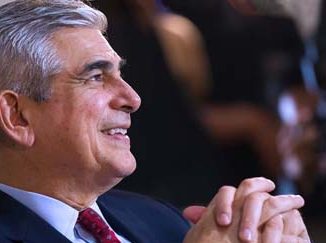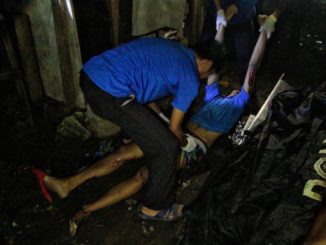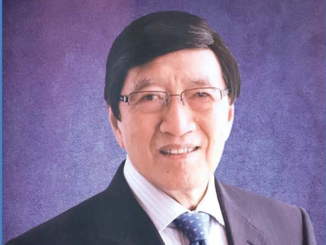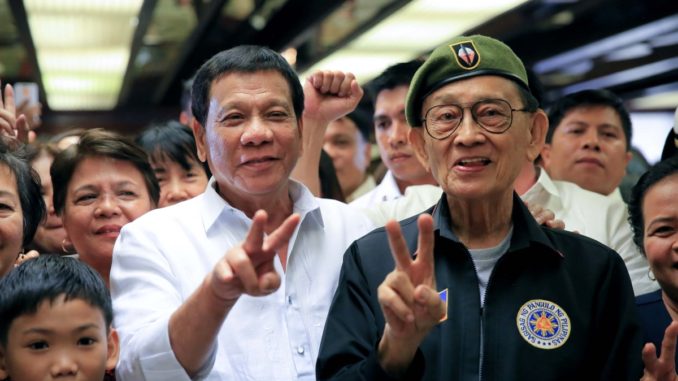
According to the late Ramon Magsaysay (who was president from Dec. 30, 1953 to March 17, 1957), “the President should set the example of a big heart, an honest mind, sound instincts, the virtue of healthy impatience and an abiding love for the common man.”
Rodrigo Roa Duterte, 72, has these attributes – a big heart, an honest mind, sound instincts, the virtue of healthy impatience, and an abiding love for the common man. He possesses them in great abundance, not only as a President, but as a lawyer, as a public servant, and as a common man.
An honest mind
As to having an honest mind, Duterte, a lawyer, former prosecutor and Davao mayor of 23 years, readily telegraphs what he plans to do even before he can work out the details.
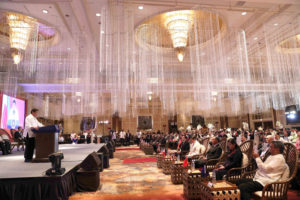 He announced early on he would go after drug lords and drug addicts. The result has been a spate of celebrated killings – of drug lords like the mayor of Albuera, Leyte, Rolando Espinosa on Nov. 5, 2016, killed while under police detention, and the mayor of Ozamiz, Misamis Occidental province, Reynaldo Parojinog Sr. and 14 others inside his house on July 30, 2017. A notorious Iloilo drug lord Melvin “Boyet” Odicta Sr. and his wife were killed after embarking from a passenger ship on Aug. 29, 2016.
He announced early on he would go after drug lords and drug addicts. The result has been a spate of celebrated killings – of drug lords like the mayor of Albuera, Leyte, Rolando Espinosa on Nov. 5, 2016, killed while under police detention, and the mayor of Ozamiz, Misamis Occidental province, Reynaldo Parojinog Sr. and 14 others inside his house on July 30, 2017. A notorious Iloilo drug lord Melvin “Boyet” Odicta Sr. and his wife were killed after embarking from a passenger ship on Aug. 29, 2016.
Three alleged leaders of drug syndicates serving prison terms, Li Lan Yan, Chu Kin Tung, and Wong Men Ping were stabbed to death at the Davao Penal Colony on Aug. 16, 2016. The police admit to killings more than 2,000 others as suspects in the state’s illegal drugs war.
Why the intense focus on drugs?
Duterte explained it in his Second State of the Nation Address (SONA) last July 24. He said:
“I believed then, as I believe still, that progress and development will sputter if criminals, illegal drugs, illegal users of drugs are allowed to roam the streets freely, victimizing seeming with impunity, the innocent and the helpless. Worse yet, there were times in the past when the protectors of the people were themselves the perpetrators of the very crimes they were tasked to prevent or suppress. It is ironic as it is madness.”
“I have learned that economy surges only when there is peace and order prevailing in places where investors can pour their capital and expertise. I have learned from my experience in Davao City that investor confidence [is] bolstered and fortified only if a potent force and mechanism for protection of local and foreign investments are in place.”
Drugs and development
Clearly, Duterte conflates drugs with peace and order, development, and economic growth.
“I have resolved that no matter how long it takes, the fight against illegal drugs will continue because that is the root cause of so much evil and so much suffering that weakens the social fabric and deters foreign investments from pouring in. The fight will be unremitting as it will be unrelenting,” the President vowed in his SONA.
As to integrity, Duterte has vowed an honest government and to curb corruption. He says he will resign at the slightest hint of him being found corrupt.
Duterte is clean, say businessmen
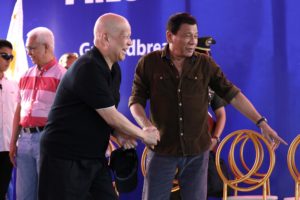 “Businessmen have really no complaints about President Duterte’s honesty and transparency,” says Jose “Titoy” Pardo, the chairman of the Philippine Stock Exchange. He says he has talked to tycoons like Ramon Ang (of San Miguel) and Manny Pangilinan (of PLDT and Meralco) and they could not complain about corruption at the top. His cabinet are competent and have integrity.” “But the lower levels of the bureaucracy, there is corruption,” Pardo confides.
“Businessmen have really no complaints about President Duterte’s honesty and transparency,” says Jose “Titoy” Pardo, the chairman of the Philippine Stock Exchange. He says he has talked to tycoons like Ramon Ang (of San Miguel) and Manny Pangilinan (of PLDT and Meralco) and they could not complain about corruption at the top. His cabinet are competent and have integrity.” “But the lower levels of the bureaucracy, there is corruption,” Pardo confides.
At the grassroots, Pardo notes, “people seem to accept the killings in the drugs war. Lawlessness is gone. The drive keeps us peaceful.”
Indeed, despite complaints about the rising number of killings, Duterte job approval and popularity ratings remain sky high – a gratifying 82%, and rising, not falling.
Build, build, build
The Duterte administration has embarked on a massive P8 trillion to P9 trillion infrastructure program called “Build, Build, Build”. The money will help finance no less than 75 infrastructure projects, 53 of which will cost P1.579 trillion — $80.5 billion.
“Build, Build, Build” will create 1.5 million jobs, raise government infra spending to 5% of GDP, modernize the economy, boost economic growth to 7%-8% yearly, reduce poverty from 21.6% today to 14% by 2022, rescue eight million Filipinos from poverty, and make the Philippines a high middle income country by the end of Duterte’s presidency when Filipinos are expected to have a per capita income of $5,000, in current dollars. (See projections, PPP Targets, page 34).
The Duterte administration is also reforming taxation. It will require the rich to pay more in taxes (on the diesel and gasoline they use, on the cars they buy, on sugar they consume, and on their assets and income). The poor, or those who earn P250,000 or less a year, will not pay any income taxes.
The new taxes
Annual additional revenues from the so-called TRAIN – Tax Reform for Acceleration and Inclusion designed by Albay Rep. Joey Salceda—will be P133.8 billion in the first year, rising to P269.9 billion by 2022. (See pages 14-15)
In the first year (2018), personal income taxes will be reduced by P137 billion. That will be made up for by these taxes: value added tax P89.3 billion, petroleum excise tax P74.4 billion, auto excise taxes P24 billion, and tax administration, P43.8 billion.
Tax for road use, sugar consumption
In addition are taxes from complementary measures amounting to P65.8 billion broken down into: P12.9 billion from the doubling of the road users tax, P47 billion from sugar sweetened beverages, and P6 billion from an amnesty on estate taxes (which tax is reduced to 6%).
Political will
One thing notable about Duterte, Pardo points out, “he has political will.”
For that, “we may be seeing the emergence of the most powerful Philippine president since Ferdinand Edralin Marcos,” says Manila Standard columnist Andy del Rosario, with some caution.
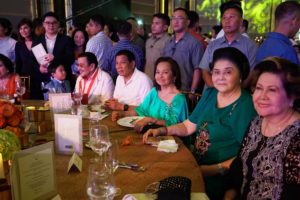 Adds newsman Del Rosario, a former envoy to European countries: “To those who think the former Davao City mayor may have overreached his competence, they are mistaken. Duterte is cunning and unpredictable in his political moves. After appointing Gina Lopez of the wealthy and influential Lopez family as Environment and Natural Resources Secretary, Duterte last (Aug. 30) vowed to go after the Lopezes and their various companies. The President said he would do this because the Lopez companies were not paying the right taxes and the huge debts they owed the government.”
Adds newsman Del Rosario, a former envoy to European countries: “To those who think the former Davao City mayor may have overreached his competence, they are mistaken. Duterte is cunning and unpredictable in his political moves. After appointing Gina Lopez of the wealthy and influential Lopez family as Environment and Natural Resources Secretary, Duterte last (Aug. 30) vowed to go after the Lopezes and their various companies. The President said he would do this because the Lopez companies were not paying the right taxes and the huge debts they owed the government.”
Issue with Chief Justice
An indication of Duterte’s formidable political influence and political capital, the President’s henchmen in the House of Representatives have endorsed an impeachment complaint that could render Chief Justice Maria Lourdes Sereno jobless before her long 18-year reign ends in 2030. Sereno has been into Duterte’s cross hairs for the judiciary’s penchant to issue temporary restraining orders on “critical government projects and cases involving government assets”, and in one particular case, in the Supreme Court’s holding its decision that should have allowed the use of population planning devices like subdermal implants. As a result, the government has lost P350 million from unused stockpile of the implants.
Issue with Ombudsman
Duterte has also scored Ombudsman Conchita Carpio Morales, a distant relative (his son-in-law, Manases Carpio is the jurist’s nephew) for alleged partiality. Senators Juan Ponce Enrile and Greg Honasan were allowed bail despite being charged with the same offense, graft or plunder, in connection with the misuse of their pork barrel funds, while Senators Bong Revilla and Jinggoy Estrada have rotted in police custody.
Jinggoy was released on bail on Sept. 16, 17 days after Duterte’s televised speech denouncing Ombudsman Morales. (see story on pages 4-5) “No less than the Ombudsman, which is supposedly the embodiment of everything that is just, fair and reasonable, has not exactly lived up to its constitutional mandate,” Duterte exclaimed in that speech.
Pro-people policies
In many actions and policies in his presidency of 15 months, Duterte has shown a pro-people and pro-environment stance. He has asked miners to pay higher taxes in exchange for responsibly despoiling the environment. Said Duterte:
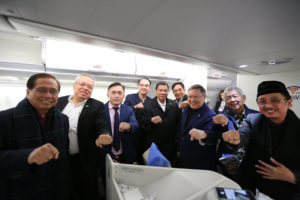 “Ours is a rich country. Wealth that this country is endowed with [is] a gift from God to be utilized for the [people’s] welfare and the common good. I do not believe that this gift was given to us to be merely viewed or appreciated, but to be extracted from the earth and utilized to make life worth living.”
“Ours is a rich country. Wealth that this country is endowed with [is] a gift from God to be utilized for the [people’s] welfare and the common good. I do not believe that this gift was given to us to be merely viewed or appreciated, but to be extracted from the earth and utilized to make life worth living.”
“That is why I say that it is not enough that we mine this wealth. What is more important is that we convert the raw material thereof into finished products for international and local purposes. [applause] That way, it will not only be the few who are the rich but also the poor who are many who will benefit therefrom.”
“Therefore, I call on our industrialists, investors [and] commercial barons to put up factories and manufacturing establishments right here in the Philippines to process our raw materials into finished products.”
“If possible, we shall put a stop to the extraction and exportation of our mineral resources to foreign nations [applause] for processing abroad and importing them back to the Philippines in the form of consumer goods at prices twice or thrice the value of the original raw materials foreign corporations pay for them.”
“However, in the extraction and utilization of these resources, extreme care must be exercised that we do not recklessly and needlessly harm the environment.”
Pro-poor actions
Free tuition. When Congress passed a bill mandating free tuition in all state colleges and universities, President Duterte’s economic managers vociferously objected to his signing it into law. For two reasons – lack of money (P50 billion would be needed) and not everyone who wants to go to college is entitled to it. Notably, only 12% of the college-age poor are in college.
Duterte signed the bill anyway and ordered his finance men to look for the funds. So next year, with P50 billion funding, every Filipino of college age can enter a state college or university without paying a centavo of tuition.
Free housing. In March 2017, thousands of homeless poor and squatters illegally occupied 4,000 government-built houses intended for government workers. Instead of sending government troopers to evict the illegal occupants, Duterte opted to give the units to their illegal occupants.
Cheap rice. To make cheap rice available to the poor, the President has changed the rules on government-to-government rice importation, ending monopoly by the state National Food Authority. Since June 2017, rice imports are now a joint government-private sector effort. Government will intervene when the private sector speculate on rice supplies. Relatedly, Duterte has done away with irrigation fees. Irrigation, which doubles rice output, is now free.
End to ENDO. The Duterte administration has also made vigorous to end six-months-only employment contracts – the so-called ENDO (end of contract every six months). The contractualization puts temporary employees at the mercy of employers reluctant to extend 13th month bonus, health and other benefits given regular workers. With ENDO. Employers save an equivalent of four months worth of pay (without work by the employee).
Regular workers normally would get an annual pay equivalent to 16 months’ pay – 12 months of regular salary, 13th month legally mandated Christmas bonus, a 14th month bonus given by the employer out of his generosity, a 15th month to cover 15 days of sick leave and 15 days of vacation, and the 16th – the equivalent of fully paid 30 days of, if more more, holidays.
The Philippines has the most number of holidays in the world, between 32 and 34 days in a year, and that is without counting storm-induced holidays and instant holidays like the Sept. 21 Day of Protest Against Government Abuses declared by Duterte on Sept. 19, 2017.
Improved services to the people
“The people’s patience is wearing thin. So is mine,” Duterte said in his SONA. Accordingly, he reiterated his directive “to all government agencies from frontline services to our people from womb to tomb—to further streamline their respective services to make these truly efficient, and people-friendly.”
“We want to ensure that our people receive the quality services that they deserve, minus the delays caused by bureaucratic red tape. I expect speedy reforms along this line,” he added.
Cutting government bureaucracy
To improve government finances and curb corruption (with idea that having more government workers does not result in better service but in fact, leads to corruption), Duterte has sanctioned what he calls right-sizing. The government employs about two million workers. It can make do with half of that, without diminished quality public service.
“We will right size the national government,” Duterte has said. “Let us trim the excess fat and add more muscle through the expeditious passage of ‘The Act Rightsizing the National Government to Improve Public Service Delivery and for other Purposes’.”
The President also wants the number of government corporations reduced and a drastic cut in allowances and perks of their directors and managers.
Duterte was born on March 28, 1945 in Maasin, Southern Leyte to Vicente Duterte and Soledad Roa who were both civil servants. His mother was a public school teacher while his father was a government worker.
Duterte traces his roots to the Visayas. He spent his early years in Danao, Cebu, the hometown of his father.
But his lineage has also direct ties from Mindanao as his mother hails from Cabadbaran, Agusan del Norte while his paternal grandmother was a Maranao.
In 1949, when Duterte was four years old, his family resettled in the then-undivided Davao where his father Vicente later entered the political arena and was elected governor of the province and served from 1959 to 1965.
Duterte graduated in 1968 with a Bachelor of Arts degree in Political Science at the Lyceum of the Philippines University and obtained a law degree from San Beda College of Law in 1972.
He passed the bar exam that same year. He served as special counsel and later on became a city prosecutor at the City Prosecutor’s Office in Davao City from 1977 until 1986, when he was appointed as OIC Vice Mayor of Davao City.
Senate committee oks D30 tax reform
The Senate Ways and Means Committee endorsed to the Senate as a whole on Sept. 20, Senate Bill No. 1592, the chamber’s version of House Bill 5636 on tax reform.
The Senate bill exempts from income tax the first P150,000 income of individuals (including self-employed and entrepreneurs); taxpayers with four children will not be taxed for income up to P250,000. The bill retains the House’s P82,000 tax exemption for 13th month pay and other bonuses and the maximum P100,000 additional exemption for up to four dependents.
The Angara bill also introduces a flat 8% tax option, on annual gross income of the self-employed and professionals, including traders, sari-sari store and canteen operators, market vendors, hardware-store owners, tricycle drivers and fishball vendors.
The Senate version adopts the House’s P3-million threshold for VAT- exempt sale or lease of goods and services — from P1.9 million. Small businesses with P3 million or below annual sales are also exempt from paying VAT, and also from filing the monthly VAT return and quarterly percentage tax returns.
Retained for VAT exemptions are sales related to food production, health care, and socialized housing, as well as exemptions for the BPO industry, cooperatives, PWDs (persons with disabilities), and senior citizens.
The Senate will adopt the House’s five-tier auto sales excise tax rates and exempts from excise tax hybrid and electric cars. Coal will have higher excise tax.
Sugar-sweetened beverages (SSB) will still be taxed
P5 per liter for beverages with caloric sweeteners, P3 for those with non-caloric sweeteners, and P10 for those that use high fructose corn syrup (HFCS).
After two years, the SSB tax will be P0.05 per gram of sugar per beverage — which is a tax regime that hopefully incentivizes manufacturers to produce and consumers to drink less sugary drinks.
Exempt from tax are milk and on coffee, including its “3-in-1” variety.
Estates and donations will be subject to a flat 6% tax on the net estate. Estates worth P200,000 or less have no tax. Those above P10 million will pay P1.25 million estate tax plus 20% of amounts above P10 million.
Sonny Angara said the tax bill will raise P134 billion in additional revenues.

